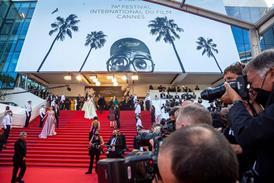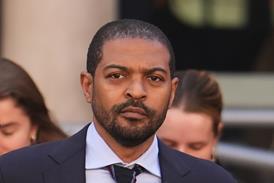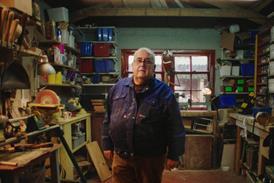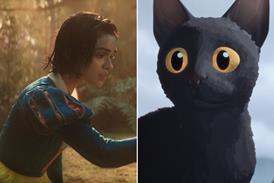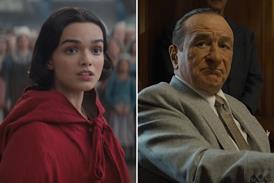IDFA top prize-winner is a timeless train trip through black-and-white archive footage
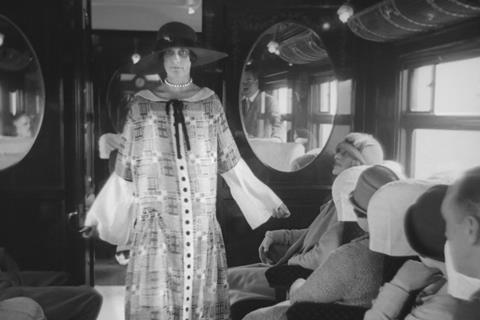
Dir: Maciej J. Drygas. Poland. 2024. 80 mins
A timeless, thought-provoking work of great formal beauty, Trains centres on trains in the twentieth century – the building of, the taking of, the driving of, the commandeering of, the bombing of, the dismantling of. Compiled entirely from black-and-white archive footage, it gradually establishes a hold on its audience, and a vision of the century’s dreams and nightmares, through wavelike repetition and variation.
Riveting – in both senses of the word
For a distracted viewer, veteran Polish archival documentary specialist Maciej J. Drygas’ latest work may play as little more than cinematic wallpaper, which is why it deserves to be seen wherever full attention is assured. Scheduled future stops must surely include a raft of other festivals, followed perhaps by branch-line engagements at adventurous indie arthouse venues.
Drygas and his team apparently consulted almost a hundred separate film archives around the world and ended up using footage from around 45 of them. There is no audible dialogue in the clips that were chosen, and no external commentary, either in voice-over commentary or intertitles. The one gloss the director allows himself is an opening quote from Franz Kafka that sets a sombre tone: “There is plenty of hope, an infinite amount of hope – but not for us”.
The opening scenes are riveting – in both senses of the word – as we watch steam engines being assembled in a huge factory by workers who seem slaves to the machine. We move onto passengers in old-style hats and coats waiting to board a train, and reflect, as we see bucolic scenery pan past train windows, how strange, new and cinematic this experience must have seemed to those early rail travellers (later, there’s a glimpse of a mid-century novelty that never really caught on – a cinema carriage).
But soon enough, we’re watching First World War troops marching and lining up to board repurposed flatbed freight carriages and seeing shells being manufactured, loaded onto wagons and even fired from railway howitzers which recoil back along their tracks.
This theme of war takes up large parts of a film, almost entirely set in Europe, that deploys its found footage chronologically but slows down when it reaches the century’s two global conflicts. We’re left to guess at some locations, grasping for place names or trying to assign faces to nationalities, but other sequences admit no doubt. There’s Hitler, waving to adoring crowds from a train door as a blonde Aryan girl brings him a basket of local produce. Here’s an SS officer’s home movie, showing his fellow Nazis larking about in their compartment. And here are lines of tired women, men and children bearing suitcases, helping each other board cattle carriages with a kindness and grace that seems to cut through the fear. Later we will see a horrific sight through the open doors of similar carriages, and we will note a tremor in the hand that is holding the camera.
Drygas seems partly to be letting the footage lead him, and partly to be using it to construct an argument about how a form of transport associated in its early days with wonder, speed and joy could become something monstrous. We find ourselves making pairs: evacuated children being fed soup, Nazi officers eating soup; a woman writing air mail letters on a train, mail being sorted on the London to Scotland night train, in what looks like outtakes from pioneering British documentary Night Mail. All footage runs without any original recorded sound. It’s accompanied instead by a soundtrack of atmospheric foley work – marching boots, train wheels racing over sleepers – that alternates with an undertow of eerie booms and metallic groans and passages from Polish composer Pawel Szymanski’s jagged train-themed classical piece, ’Compartment 2, Car 7’.
Not every scene we see here is train-related. But to take just one example, archive footage of disfigured First World War casualties being fitted with prosthetic face masks, coming after we have watched wounded soldiers queuing to board a medical train, justifies its inclusion thanks to the bitter irony it carries – the victims of advances in weaponry being compensated for their sacrifice by advances in plastic surgery. This too is one kind of train. Drygas’ decision to confine his research to black-and-white footage leads the film to end without any other good reason somewhere, at a guess, in the early sixties – but this randomness is redeemed, at least in part, by a memorable final scene.
Production companies: Drygas Film Production
International sales: Drygas Film Production, vita.zela@gmail.com
Producers: Vita Zelakeviciute
Editing: Rafal Listopad
Cinematography: Andrzej Musial
Music: Pawel Szymanski




